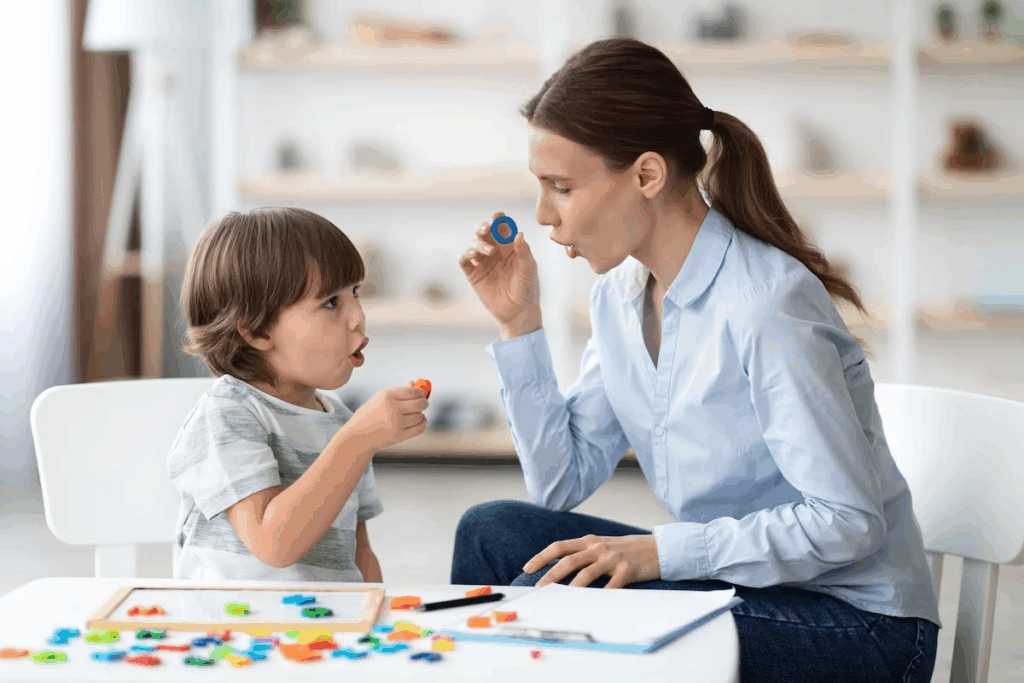Last Updated on November 17, 2025 by

Smartphones are everywhere, even in the hands of young kids. This has made parents wonder if phones cause speech delay and how too much screen time might affect their children’s ability to talk. Many parents worry that extended phone use could slow down their kids’ language growth.
Studies have explored the question: Do phones cause speech delay? Research from SickKids found a strong link between excessive screen exposure and slower speech development in children. This suggests that too much phone time may negatively affect how kids communicate and solve problems.
At Liv Hospital, we highlight the importance of balanced screen time and interactive communication for healthy child development. To learn more, check out this article on how phones cause speech delay in toddlers.
Today, kids under two are often using mobile media devices. This has raised big worries about the effects of digital devices on kids. A 2017 study in the US found that 46% of children under two had used a mobile device at least once. This shows we need to look closely at how digital devices affect child development, like speech.
Smartphones and tablets are becoming more common in early childhood. This has raised concerns about their impact on child development. As kids grow, they hit important speech milestones. It’s key for parents and caregivers to understand how digital devices affect speech development.

Speech development is vital in early childhood. Kids usually start babbling by six months, say their first words by 12 months, and combine two words by 24 months. Research suggests that too much screen time might slow this down.
Some important speech milestones include:
Parents and caregivers should watch for these milestones and check their child’s progress. If there’s worry about a child’s speech milestones, talking to a healthcare professional is a must.
Studies show a strong link between screen time and delays in speaking. As phones become a big part of our lives, it’s key to know how they affect kids.
A study found that more screen time at 18 months can lead to a 49% increase in speech delay. This shows the dangers of screens for young kids. It’s important for parents to watch how much time kids spend on devices.
Kids under two are at high risk for language challenges from screens. Too much screen time can hurt their ability to talk. Parents should keep an eye on screen time for young kids.
Setting screen time limits is key to avoiding problems. Doctors say kids over two should use screens for 1-2 hours a day. Too much can harm their talking skills and development.
Knowing how screens affect language is important for kids’ communication. By being mindful of risks and limiting screen time, parents can protect their children.
Smartphones have changed how kids learn language. It’s key to know how they affect child development, like language skills.
Too much phone time can cut down on talking between parents and kids. This talk is vital for learning a language.
Studies have shown that phones can make kids less likely to talk. This can slow down their language growth.
Phone use often means just watching or reading. This doesn’t help kids learn language like talking and doing things together do.
Interactive learning means kids talk, answer questions, and start conversations. These are key to growing language skills.
Too much phone time can make kids’ attention spans short. This makes it hard for them to understand and use language well.
This problem can slow down how kids learn language.
Phone use can take away chances for kids to learn language in real life. This includes talking to others, reading, and having conversations.
Parents should make sure kids have time for these important language activities too.
In today’s world, it’s key to set healthy digital limits for kids. This helps their speech skills grow. Parents need to know how digital devices affect their children’s language.
The American Academy of Pediatrics says kids under 2 should watch screens less. Kids 2-5 can watch 1 hour a day of educational shows. It’s best if parents watch with them to help them earn more.
For kids under 18 months, screens are only okay for video calls with family. Kids 18-24 months can watch some educational shows, but parents should watch with them too.
Watching TV or using devices with kids can really help them learn. Parents can help kids understand and use what they see or hear.
Studies show that watching together can boost kids’ language and thinking skills. Parents can ask questions and encourage kids to think critically during these moments.
Not all screen time is good for kids. Interactive media, like educational apps, can help with language and thinking. But watching TV passively can hurt language skills.
Parents should choose interactive content and limit TV watching. They can also use devices for interactive learning, like video calls with family.
Too much screen time can lead to speech delays in kids. Parents should watch for signs like a small vocabulary, trouble talking, and not wanting to play.
If parents see these signs, they should talk to a doctor or speech therapist. Early help can really help kids catch up with their language skills.
Technology is becoming more important in our lives. It’s key to find a balance between using it and helping kids grow. Too much screen time can harm kids, like causing speech delays.
Parents worry about how tech affects kids’ language skills. It’s true that too much screen time can hurt language development. But parents can take steps to protect their child’s language skills.
Setting limits on screen time and watching TV with kids can help. Being careful with how much tech we use helps kids speak well. This way, kids can grow up with strong communication skills in our digital world.
Too much screen time can slow down speech in kids. It cuts down on talking between parents and children. It also makes kids watch more passively and miss out on real language learning.
Key milestones include babbling by six months and saying first words by 12 months. By 24 months, kids should use two words together. Watching these milestones can help spot speech delays early.
Kids under two are at high risk. Too much screen time at this age can hurt their ability to speak clearly.
Experts say no screens for kids under two, except for video calls. For two to five-year-olds, screen time should be limited. Set limits, watch with your child, and pick interactive shows.
Watching TV together and being involved can help. It makes learning fun and interactive. It also helps kids understand and learn better.
Look for no babbling or gesturing by 12 months. No single words by 16 months, and no two-word phrases by 24 months. If worried, talk to your doctor or a speech therapist.
Choose interactive content that teaches and engages. Limit passive media. Watch with your child to help them understand and learn.
Subscribe to our e-newsletter to stay informed about the latest innovations in the world of health and exclusive offers!